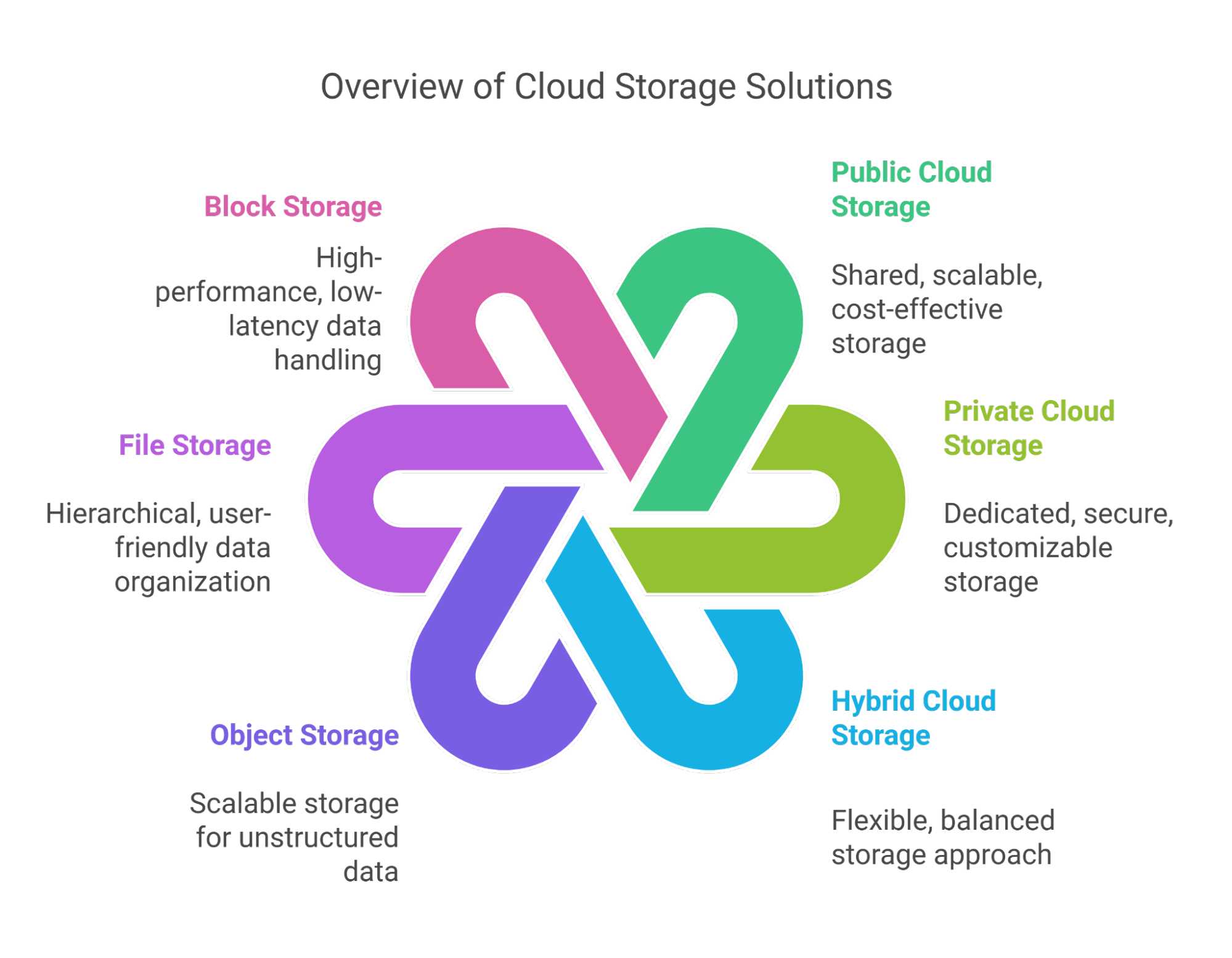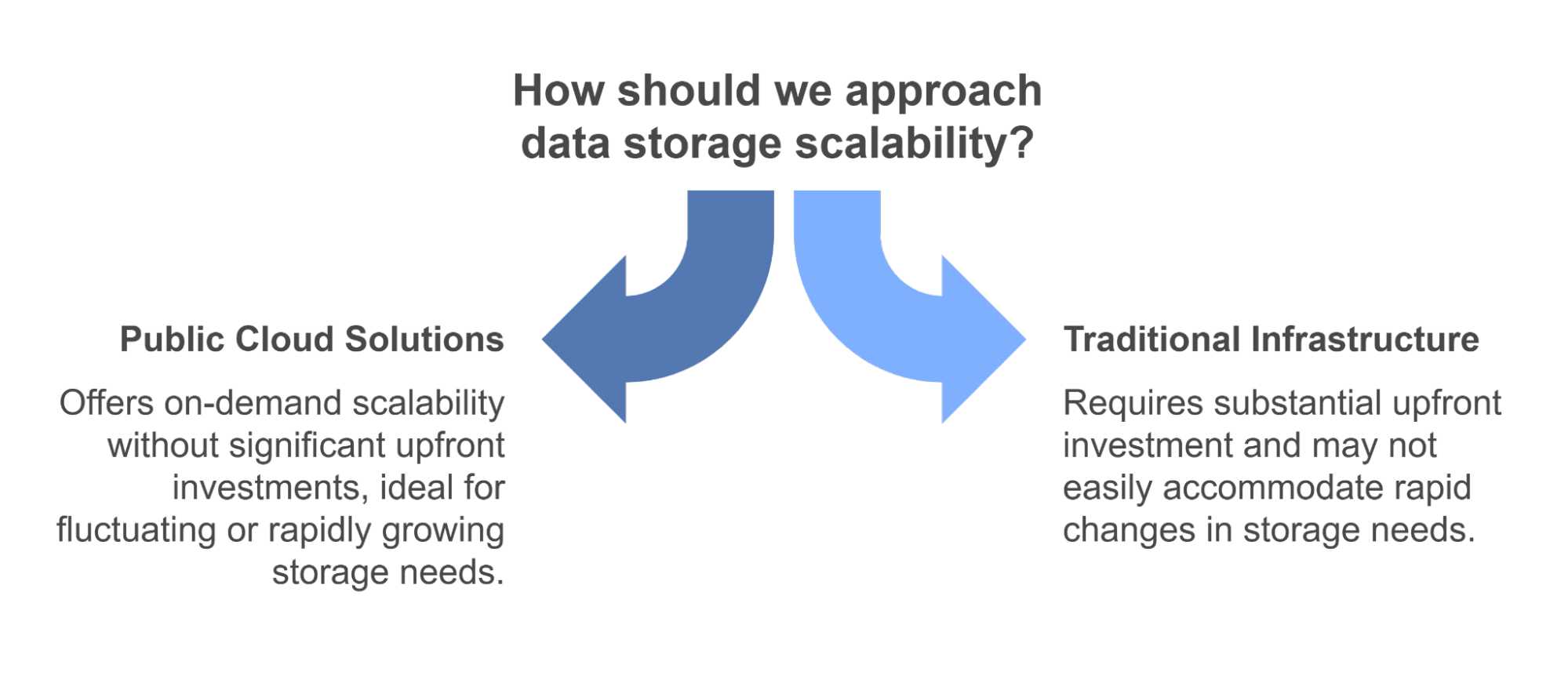The sheer volume of data businesses handle today is enormous. Globally, approximately 402.74 million terabytes of data are created daily. Whether it’s supporting remote teams, storing large files, or maintaining backups, cloud storage has become a cornerstone of modern business operations, and cloud storage solutions have become essential.
With so many cloud storage solutions available—from hyperscalers like AWS and Azure to more specialized providers—it’s critical for business decision-makers to evaluate solutions that align with their needs for cost, security, and scalability.
| “Cloud storage isn’t just a convenience; it’s a necessity for businesses that need to remain agile, secure, and competitive,” says Tim Timrawi, CEO of Sharktech. “The right solution empowers businesses to control their data while reducing costs and improving operational efficiency.” |
In this blog, we’ll explore:
- The different types of cloud storage solutions and their uses
- Key factors to consider, including security, cost, and scalability
- How to choose the best solution to support your organization’s goals
What is Cloud-Based Storage?
Cloud storage is a technology that allows businesses and individuals to store, manage, and access data over the internet, rather than relying on local servers or physical hardware.
Instead of housing data on-site, files are stored in remote servers managed by a cloud provider at a data center. These servers are accessible anytime, anywhere, as long as there’s an internet connection.
It allows businesses to easily expand data storage space without significant upfront investments in physical infrastructure. It also eliminates the limitations of on-premise storage, such as costly hardware upgrades, maintenance operations, and space.
Cloud storage provides seamless data access for remote and distributed teams. Whether employees are in the office, working from home, or traveling, they can securely access and collaborate on files in real time. This accessibility not only improves productivity but also ensures business continuity in today’s increasingly hybrid work environments.
Types of Cloud Storage Options
Choosing the right cloud storage solution starts with understanding the various types available and their unique advantages. From businesses managing large data volumes to smaller organizations needing basic storage, there’s a storage system designed to meet every need.
In this section, we’ll break down the primary storage types and solutions to help you identify the best fit for your operations.
Types of Storage
1. File and Block Storage
File and block storage are traditional cloud storage models that serve more structured data needs.
- File storage: This model organizes data into a familiar, hierarchical file and folder system. It’s user-friendly, easy to navigate, and ideal for smaller teams or collaborative environments (e.g., Many platforms like Dropbox offer this storage type.).
- Block storage: Data is split into fixed-sized blocks and stored independently for high-performance workloads. It’s particularly well-suited for databases, virtual machines, and enterprise applications that require low latency.
The advantages of file and block storage include:
- Simplicity: File storage is intuitive and requires minimal setup for small teams.
- Performance: Block storage delivers faster access times and low latency for critical workloads.
- Flexibility: Businesses can integrate file and block storage into cloud environments to meet various data needs.
Both models provide efficient solutions for businesses with specific data organization and performance requirements.
2. Object Storage
Object storage is designed for scalability and is ideal for managing large amounts of unstructured data, such as media files, backups, and archives. Instead of organizing data into files or folders, it stores data as discrete units (objects) with unique identifiers, making retrieval simple and efficient.
This type of storage is often used for:
- Data backups and disaster recovery
- Large-scale content storage (e.g., videos, images)
- Big data analytics requiring high storage volumes
Object storage solutions, like Amazon S3 or Sharktech S3-compatible storage, are cost-effective for businesses managing vast amounts of data without performance limitations.
Cloud Storage Solutions
1. Public Cloud Storage
Public cloud storage is a shared, multi-tenant environment where resources like servers and storage are managed by a third-party provider, such as AWS, Google Cloud, or Microsoft Azure. Businesses access and store their data on shared infrastructure while benefiting from the provider’s scalability, global reach, and built-in maintenance.
This solution is ideal for organizations looking for affordable, on-demand access to cloud resources without the burden of managing hardware. However, public cloud storage comes with trade-offs like limited control over infrastructure and potential concerns about security in shared environments.
2. Private Cloud Storage
Private cloud storage is a dedicated solution where infrastructure is reserved exclusively for one organization. It can be hosted on-premise or managed by a third-party provider but remains isolated from other users. This ensures greater control, security, and customization capabilities compared to public cloud options.
Benefits of private cloud storage include:
- Enhanced security: Data is stored in an isolated environment, reducing exposure to vulnerabilities.
- Full customization: Organizations can tailor configurations to meet their specific performance needs.
- Predictable costs: With dedicated resources, billing is consistent and easier to forecast.
While private cloud storage offers significant advantages, it often requires a higher upfront investment. However, it is ideal for businesses handling sensitive data or with strict performance requirements.
3. Hybrid Cloud Storage
Hybrid cloud storage combines elements of both public and private clouds, allowing businesses to leverage the benefits of each. For instance, sensitive or mission-critical data can be stored in a private cloud for greater security, while less critical workloads and applications can run on a public cloud for scalability and cost efficiency.
80% of businesses already embrace a hybrid cloud approach. Hybrid solutions are particularly useful for organizations with diverse data needs, as they provide flexibility, redundancy, and cost optimization. Businesses often adopt this model to balance performance, security, and resource management without being tied to a single environment.
Key Factors to Consider When Choosing a Cloud Storage Solution
Choosing the right cloud storage solution requires a careful evaluation of your business’s priorities, from cost and security to performance and scalability. Not every solution will be suited to your needs and selecting one that’s poorly suited can increase your costs, reduce operational efficiency, and even increase security risks.
Below are the key factors to consider when selecting the cloud storage best for your business.
1. Secure Cloud Storage
Data security is critical for every business. A study by the University of Texas found that 94% of companies suffering from a catastrophic data loss do not survive, 43% never reopen, and 51% close within two years.
It’s important to know that public cloud solutions often share infrastructure, which can create vulnerabilities and leave businesses dependent on their provider’s security protocols.
In contrast, private cloud solutions offer isolated infrastructure, providing businesses with full control over their security configurations.
2. Cost and Billing Transparency
Cloud pricing models can vary significantly. Unfortunately, understanding cloud costs and invoices is notoriously unclear and difficult to predict. Public cloud providers often use a pay-as-you-go model, and hidden fees—such as data egress charges or tiered pricing—can inflate costs unexpectedly.
To avoid cost issues, businesses should prioritize providers offering transparent, predictable pricing to avoid surprises and consider using cloud cost management tools.
Private and hybrid cloud solutions may come with higher upfront costs but often provide more consistent billing. Providers like Sharktech deliver cost-effective cloud storage with clear, straightforward pricing that aligns with business budgets.
3. Scalability
As data demands grow, the ability to scale storage capacity seamlessly becomes essential.
Public cloud solutions are particularly advantageous in offering on-demand scalability, allowing businesses to expand storage without significant upfront investments in infrastructure. This is especially beneficial for organizations with fluctuating storage needs or those experiencing rapid growth.
A key consideration when evaluating scalability is understanding your current and future storage requirements. Ask questions like, “How much file storage do I need today, and how will this change in a year?” Providers with flexible scaling options can help ensure your solution grows alongside your business.
4. Flexibility
Flexibility in cloud storage refers to the ability to customize solutions to meet specific performance or operational requirements. Public cloud solutions excel in this area, enabling businesses to tailor resources, configurations, and security protocols to their unique needs.
Hybrid cloud solutions add another layer of flexibility by combining public and private cloud benefits. For example, businesses can store sensitive or mission-critical data in a private cloud while leveraging the public cloud for less critical workloads. This balance ensures cost efficiency without sacrificing control or performance.
5. Freedom to Move Workloads
One of the biggest challenges with many hyperscalers is vendor lock-in, where businesses are tied to proprietary technologies and long-term contracts. This restricts flexibility and makes it difficult to adapt to evolving needs.
Opting for open-source-based or non-restrictive cloud solutions ensures that workloads can be moved, scaled, or restructured as business needs evolve. This freedom reduces dependency on specific providers and empowers organizations to make changes without incurring excessive costs or disruptions.
6. Performance and Uptime
High-performance cloud storage is essential for ensuring quick and reliable access to critical data and applications. Businesses should prioritize providers with strong uptime guarantees and robust redundancy measures to minimize downtime and maintain operational continuity.
Built-in protections, such as safeguards against cyber threats and system failures, further enhance reliability. Evaluating a provider’s track record for uptime and their ability to handle unexpected disruptions is key to ensuring consistent performance.
7. Support and Ease of Management
Reliable and accessible support is a critical factor when managing cloud storage solutions. Businesses should consider the availability and quality of a provider’s support services, as limited or unresponsive support can lead to costly delays during critical issues.
Look for providers offering comprehensive, around-the-clock assistance without requiring premium fees. Effective support not only resolves technical problems quickly but also ensures that businesses can manage their cloud environments efficiently, regardless of complexity.
| Read these next:
|
Make the Smart Choice for Your Cloud Storage Needs
Choosing the right cloud storage solution is essential for balancing cost, performance, security, and flexibility. By understanding the types of storage available and evaluating key factors like scalability, support, and the freedom to move workloads, businesses can find a solution that aligns with their goals.
Sharktech offers 99.999% uptime, 24/7 personalized support, and transparent, affordable pricing, making us a reliable partner for businesses of all sizes. Enjoy public cloud costs at least 20% less than standard hyperscalers – guaranteed.
With no vendor lock-in and an OpenStack-powered infrastructure, we ensure you have full control over your data and the ability to adapt as your needs evolve. Plus, with our self-serve options you can access cloud storage in minutes.
Contact Sharktech today. Let’s explore flexible and reliable cloud storage services that help your business thrive.






More to Read
The OpenStack Public Cloud Complexity Problem (And Why It’s Costing You)
Choosing the right cloud platform today is akin to trying to pick a needle
Oct
Make Growth and Security Part of Your Public Cloud Management Strategy
Managing today’s cloud infrastructure is no longer just about spinning up servers or
Sep
Leading Cloud Service Providers Explained: Types, Benefits, and How to Choose
94% of businesses now use a cloud solution in some form. Whether it’s
Aug
What is Public Cloud? A Simple Guide For Businesses
What is public cloud? It’s a model of cloud computing where infrastructure and
Jul
What is Cloud Migration? A Practical Guide for Modern Businesses
What is cloud migration? It’s the process of moving digital assets—like data, applications,
Jul
Why Some Businesses Choose Self-Managed Cloud Instead
Cloud computing has revolutionized how businesses deploy, manage, and scale their digital infrastructure.
Apr